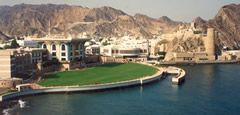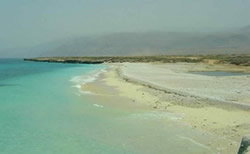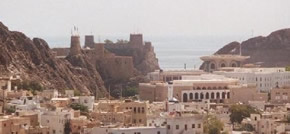
Muscat, Oman - A Friendly Middle East
Vladia Jurcova
 |
| Luxurious
complex of the Sultan's Palace and the gardens |
The
humidity and heat slapped me in my face as soon as I got
of the plane. I arrived in Muscat in the middle of the night,
so I did not get to see any of the city until the next morning.
I opened my blinds and almost fell off my feet. The unforgettable
blinding view in front of me will always be burnt into my
memory. Sun pouring over acres of lush gardens, aqua colored
water of the Gulf of Oman, a deserted pristine beach down
under the cliff and typical white oriental buildings in
the background left me speechless. Some kind of weird happiness
caused by the beauty in front of me flew inside my body.
In 2 minutes, I was wearing my bikini and covered with a
sarong for modesty, I was heading for the pool and breakfast.
But
I did not feel this way before my arrival. My new Omani friend, Abu-Jakub who
I met on the plane, addressed my first concern about the fact that I did not book
my hotel. Abu-Jakub explained that Oman is as safe as a deserted island. "You
can sleep on the side of the road with your luggage under your head and no one
will touch you!" he insisted. Well, I have to admit that made me feel much
better considering that no one really knew where I was. After expressing my desire
to travel to the Persian Gulf, my mother strictly prohibited me from leaving England
where I was studying. That did not stop me and here I was in the unknown mysterious
land of Arabs, Bedouins and camels, or at least that's what I thought. Before
the year 1970 when Sultan Qaboos bin Said acceded to the throne and started building
a new, more educated and richer state, people of the Sultanate of Oman lived in
the dark ages. Cut off from the rest of the world by the old cruel sultan, Qaboos'
father, Oman was an isolated state without any health or school systems. Technology
was prohibited as a tool of the devil and the majority of the population was jobless
and uneducated living in fear for their lives. After his return from studies in
England, young Qaboos recognized the poverty of his people and the poor standards
of living to which they were subjected and decided to put an end to this suffering.
I
must admit that Sultan Qaboos is loved by his people. Abu-Jakub told me,"He
is not only intelligent and handsome, but also generous to his subjects."
My friend Abu-Jakub, a great storyteller, told me several stories about the Sultan
and his generosity. I wished I could meet this charming man with proud features
and a white trimmed beard, but unfortunately that was impossible since the Sultan
lived in a marvelous palace in absolute luxury, surrounded by hundreds of servant,
Abu-Jakub called them slaves, and bodyguards.
My
decision to visit Oman was not just an act of random craziness of a bored college
student. During my studies in London, I was "adopted" by my lovely neighbor
Natasha. She was an African-Italian, but most of her life she spent in Muscat.
Listening to her charming stories, I fell in love with this unknown city and longed
to see it. My friend's husband, Hussam, was an Omani, and not only that; he used
to live the glamorous, rich life of the Sultan's personal bodyguard. His dream
life changed when he fell in love with Natasha and married her in secret without
the Sultan's permission. He had to leave the Sultan's services. Their love story
took them to London where they both were getting an education in order to go back
to their beloved Oman and start their lives over.
After
exchanging each other's stories, I said good-bye to my friendly acquaintance from
the plane, promised to call and headed into the humid dark night to yell for a
taxi. It proved to be an easy task and I felt much better about being alone. My
smiling taxi driver took me to my hotel, which I picked randomly (because of the
great service on my flight with Gulf Air). The Gulf Hotel in Qurum Heights, a
quaint area of Muscat, is located on the top of the cliff overlooking the breathtaking
views of the beautiful Gulf of Oman. Oman is proclaimed the best secret scuba
diving spot in the world, but that and others were secrets I was just about to
discover.
 |
Crystal
clear waters of a pristine beach
nearby the capital of Oman |
As
it appeared Abu-Jakub became my faithful friend and guide. One day, he invited
me for a trip to explore the countryside. On a Friday morning we took off to visit
a small village of Nizwa, only a short drive from Muscat. Inhabitants of Nizwa
are highly respected among Omanis. "These people are magicians," Abu-Jakub
explained. "They can change you into a goat or donkey! Be careful not to
look into anyone's eyes!" he warned me. His superstitious sister even donated
one of the colorful traditional dresses, so I would not draw attention to myself.
For the first time, I decided to cover my blond hair to be totally invisible.
Hey, I already had henna and pitch-dark eye make up, very popular among Omani
women, even my mother would not recognize me now.
When
we arrived to Nizwa, we hit the souk, or market, first. Every Friday, cows, goats
and sheep are auctioned at this busy market. Hordes of spectators stand by to
watch the amusing bargaining between the cattle owners and buyers. There are storytellers
telling stories about the people whom the local magician turned into donkeys.
Children listen in fear and adults listen in disbelief, but I knew they all believed
the old wise storytellers. Magic was a part of their life and they were respectful
of it. Since I did not understand the storytellers, I took off to check out the
local handicrafts. Omani women wear hundreds of heavy bangles on their hands and
I was dieing to buy several of those. I was also longing for the traditional birka,
a glittering, embroidered face mask worn by local ladies, mostly by the older
generation in rural regions.
As
I was wandering through the souk, I lost my guide and my veil
and
started noticing many glares from local men. Although Omani men proudly wear their
dishdasha (traditional male robe) and turbans or small expensive embroidered hats,
a lot of women wear a modernized version of the traditional colorful dresses.
The dresses are no longer loose and modest, but rather formfitting and fashion
forward. Many of these outfits hide mini skirts and tank tops, which the modern
women wear at home. The strict black veils covering the hair were exchanged for
colorful scarves that hang down their shoulders. Many women drive around in fast
convertible cars and yell at handsome men who are sipping kahwa (coffee) or eating
shewarma (special kebab) at local joints. A blond foreign girl in traditional
dress was a rare sight. More heads started turning and a bigger curious crowd
kept heading my direction. I knew I was in trouble.
My
caring host and guide, Abu-Jakub, found me and promised to show me a better market
for my kind of shopping. I was introduced to the Old Muttrah Souk located in Muttrah,
an ancient port, today, a part of Muscat that has not changed a bit over the centuries.
Small
shops offered a variety of fruits and vegetables, animals, jewelry, souvenirs
such as khangar (traditional dagger that is also featured on the Omani royal symbol)
and fabrics. My eyes were blinking, "This is by far my favorite place."
This was the real orient; a place where Aladdin would find his magic lamp; a place
where bargaining is a way of life and every step takes you back to the past. "Why
did you show me this souk a long time ago?" I asked Abu-Jakub. "I did
not want you to get a wrong impression of Muscat. It's a modern city and this
market is as old as the city itself." I wanted to scream, "But this
is what I wanted to see in the first place." But I understood. These people
are proud of their hard work bringing Oman into the 21st century and this hidden
dirty corner of their city survived only because of their respect for traditions,
not to be shown off as a tourist attraction.
 |
White
houses of the Old Mutrah |
The
new Muscat is a peaceful clean city free of the hustling, so typical for the other
Arabic countries like Morocco. Muscat reminded me of Abu-Jakub, he was a real
gentleman, so handsome and elegant in his traditional silk dishdasha. I would
never imagine that I find a man in a dress appealing.
Muscat is also a very young
city, and thus the architecture is surprisingly modern and preserved considering
the damaging forces of the nature. This city is a pearl, a green oasis in the
middle of the desert. Parks with waterfalls and fountains, lush manicured gardens,
flowers and greenery along the highways are the pride of the local inhabitants.
Beautiful landscaping is in constant war with the sand blown from the desert,
which surrounds the city. The only way of expanding Muscat is out into the desert
and I noticed many abandoned houses on the edge of the city which owners lost
the battle with nature. On the other hand, the desert and its enormous sand dunes
represent one of the popular pastimes.
Although
the month of July is usually very dry, we got quite a few showers during my first
couple of days in Oman. Thanks to this rain, my next trip was really exciting
because I was allowed to drive Abu-Jakub's brand new Land Rover Discovery across
the green water filled wadis (valleys or dried out river beds) surrounded on both
sides with perpendicular mountains. "Get it dirty!" Abu-Jakub laughed
as I was showing off my imaginary formula one driving skills to Omani men. "Lets
shoot some cans," somebody suggested when we got tired of riding in the car.
We shot a few rounds from a gun (apparently also a popular pastime) and climbed
the mountains while the servants prepared our lunch.
They
brought a small goat, which they killed and roasted with garlic and spices. Alcohol
is not allowed in Oman, so during the lunch Abu-Jakub played guitar and his friends
were singing to keep us entertained. I was not sure how I was going to deliver
them the bad news about my eating habits (a vegetarian is a word unknown to Arabs).
"I don't eat red meat," I said, "I have to refuse to eat the poor
little roasted goat." I almost cried when I saw their expressions. "We
killed this goat to honor you as our guest, habibi," Abu-Jabuk said to me.
Although they did not understand why I did not want to dance for them nor eat
meat, they politely left me alone. The friendliness of everyone I met was contagious.
The
Omani people are extremely generous and hospitable, and it was not long before
I was invited to stay with Abu-Jakub's family in their luxurious palace-like-house
full of servants; like a dream come true. Although this nation is very hospitable,
Islam is a part of every day's life (Muslim pray 5 times a day) and modesty in
clothing and conservative behavior is a must. I respected their privacy, but I
could not pass by the opportunity to experience the fairy tale life and customs
of the privileged inhabitants of this country. There are a few things that one
has to be respectful of like taking shoes off before entering the house, always
covering shoulders and knees by long loose garments and eating a lot while dinning
because it is highly expected!
The
last one, unfortunate eating, proved to be real problem in Oman, as a European
woman is always on some kind of diet restriction, I failed to satisfy my host
or his father. They felt like I never ate enough and used to send me more food
in my quarters in case I was shy to eat in front of them. Although the staple
of the Omani diet is marinated cooked meat and rice, they also served a lot of
grilled chicken, fish and salad. My favorite dish was khapsa (rise and chicken
cooked together in tomato sauce); it reminded me a lot of Italian risotto or Spanish
paella cooked with Indian spices. Many influences in Omani cuisine came from India,
as many cooks in Oman were Indian or Philippines. After each meal, kalwa (very
sweet pistachio and honey sweets) and kahva (strong bittersweet coffee) were served
by the servants.
The
women and girls normally ate separately from the men and boys, but if they had
a special guest, like me, they were allowed to eat together. Women had their own
quarters in the house. Their rooms were filled with gold, crystal, luxurious fabrics
and Italian custom designed furniture that even the White House would be proud
of. Most of the Omani women don't work, although this is changing because girls
now are allowed to study at universities, at home, as well as, abroad.
My
host's father had 2 wives. They lived in separated comfortable quarters, but brought
up all their children jointly. "Don't they hate each other?" I asked
Abu-Jakub. "Not really, they just have to get along and my father shares
everything equally between them." Abu-Jakub's mother could not have any more
children, so his father asked her for permission to take another younger wife
who can give him more children. "Arabs love huge families; family and religion
are the highest values," Abu-Jakub said. He also told me that Arabs don't
understand how western children can put their aging parents in retirement homes.
"It's unheard of in our world!" he said.
By
every conversation like this, I learned more about the traditions of this proud
nation. I was an ignorant when I arrived to this land of magicians and Sultans,
but my open mind and desire to learn and explore brought me a lot of joy. My journey
was almost at the end, and I knew that I would never be able to repay my hosts'
hospitality. These people would give me the shirt off their back and never expect
anything in return. They opened their hearts and homes to me and showed me their
culture, religion and city, the way I would have never been able to experience
alone. On my last day in Muscat, my charming prince, Abu-Jakub, was driving me
to the airport where this amazing fairy tale started. Before my departure, our
goodhearted cook came to say good-bye. He fed me well during the past weeks and
cried when saying, "Please, come back, Amira." I was crying too, when
I simply said, "Shokran."
Muscat
General Information |
In
general, a visa (cost 6 rial and lasts one month) is easy to obtain at the border
or the airport as long as the visitor is coming from a stabilized developed country.
A
lovely room at the Crown Plaza Hotel (used to be named the Gulf Hotel, address
P.O. BOX 1455, Muscat, Oman 112) overlooks the beach and pool, and a cost of 30
rials (.38 rial = 1 US dollar) included generous Arabic breakfast and great service.
Gulf
Air flies to Muscat from New York and Miami.
Most
of the taxi drivers are of the Indian origin and speak English. Many people speak
English, although Arabic is an official language.
The
hottest months are June, July and August. Temperatures may be reaching 112F (winter
months about 85F). The streets are the most of the day abandoned as many of the
local businesses closed at noon due to the heat and humidity. In summer, the locals
come out at night to walk and picnic on the beaches and hang out in the air-conditioned
shopping malls.
For
information about the local attractions and trips contact: Omani Travel & Tourism Bureau, tel: ++968 701 085, fax: ++968 789 843 and email: niche@omantel.net.om
There
is abundance of pristine beaches around Muscat accessible by car or boat. Surfing
and scuba diving facilities are available.
Habibi
- Dear
Amira
- Princess
Shokran - Thank you |
|